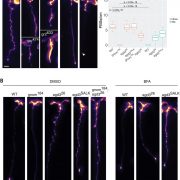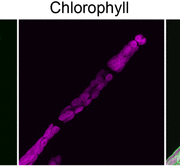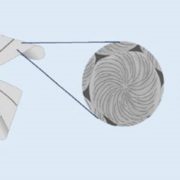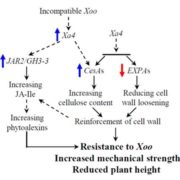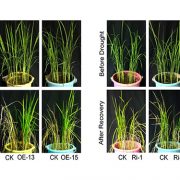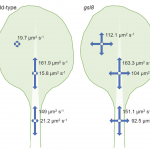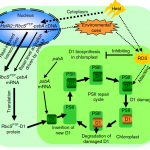Nitrate defines shoot size through compensatory roles for endoreplication and cell division (Curr. Biol.)
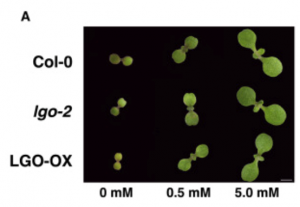 In this paper, Moreno et al. investigate how nitrate affects the balance between cell proliferation and cell expansion in shoots during early seedling development. They note that the cells in Arabidopsis cotyledons undergo considerable enlargement, and that the increase in cell size is correlated with a switch from the mitotic cell cycle to endoreplication. During endoreplication, DNA synthesis is not followed by mitosis (nuclear division), which leads to an increase in nuclear DNA. Molecularly, the mitosis/endoreplication switch is regulated by mitosis-promoting cyclin-dependent kinases (CDKs). The authors found that the CDK inhibitor LGO was upregulated in response to nitrate availability, suggesting a link between nitrogen sensing and cell cycle regulation. Consistent with this idea, mutational inactivation of LGO caused an increase in cell proliferation in nitrate-replete conditions where normally only cell expansion was observed. Interestingly, the increase in cell number compensated for their smaller size so that the final cotyledon/leaf area was unaffected, suggesting some kind of organ-level size-control mechanism. Plants generally have a rich repertoire of CDK-inhibitory proteins. Working out where and under what conditions these inhibitors act is a necessary step in understanding how the cell cycle responds changing environmental inputs. (Summary by Frej Tulin @FrejTulin) Curr. Biol .10.1016/j.cub.2020.03.036
In this paper, Moreno et al. investigate how nitrate affects the balance between cell proliferation and cell expansion in shoots during early seedling development. They note that the cells in Arabidopsis cotyledons undergo considerable enlargement, and that the increase in cell size is correlated with a switch from the mitotic cell cycle to endoreplication. During endoreplication, DNA synthesis is not followed by mitosis (nuclear division), which leads to an increase in nuclear DNA. Molecularly, the mitosis/endoreplication switch is regulated by mitosis-promoting cyclin-dependent kinases (CDKs). The authors found that the CDK inhibitor LGO was upregulated in response to nitrate availability, suggesting a link between nitrogen sensing and cell cycle regulation. Consistent with this idea, mutational inactivation of LGO caused an increase in cell proliferation in nitrate-replete conditions where normally only cell expansion was observed. Interestingly, the increase in cell number compensated for their smaller size so that the final cotyledon/leaf area was unaffected, suggesting some kind of organ-level size-control mechanism. Plants generally have a rich repertoire of CDK-inhibitory proteins. Working out where and under what conditions these inhibitors act is a necessary step in understanding how the cell cycle responds changing environmental inputs. (Summary by Frej Tulin @FrejTulin) Curr. Biol .10.1016/j.cub.2020.03.036
[altmetric doi=”10.1016/j.cub.2020.03.036″ details=”right” float=”right”]


